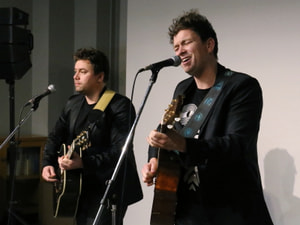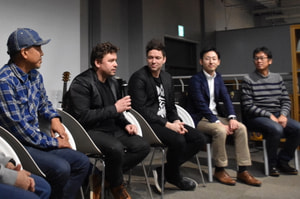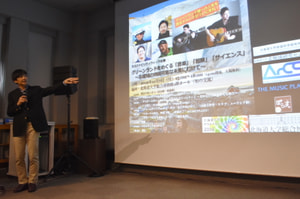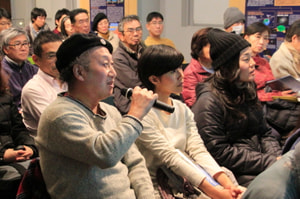The Danish territory of Greenland is attracting a lot of attention as a junction point where climate change and social change meet. For example, changes in climate, such as the rise in sea temperature and the melting of ice, are bringing numerous changes to the livelihood of people in Greenland, who live together with marine and land mammals and rely on fishing and hunting. At the same time climate change is also raising the possibility of the commercial exploitation of natural resources such as oil, natural gas and minerals, which is why more and more politicians in Greenland are calling for greater autonomy and even independence from Denmark. For these reasons Greenland is increasingly seen as an intersection of climate change and social change. Since such interplay of natural and social conditions may influence the entire planet, Greenland is attracting interest not only among researchers, but also among journalists and adventurers.
On Monday, November 7, an event entitled “Music, Adventure and Science on Greenland – For sustainable future in the Arctic – “, organized as a part of the 2016 Sustainability Week, was held at the Hokkaido University Museum. The event addressed the above-mentioned situation and explored ways for interdisciplinary collaboration. First, Shin Sugiyama from Hokkaido University, the organizer of the event, took the podium and spoke about the university’s research organization, the currently running project “ArCS: Arctic Challenge for Sustainability” which is aimed at promoting research on the Northern Polar Region, and the process leading up to the holding of the event. Next, Sumito Matoba from Hokkaido University spoke about how the changes in ice mass in Greenland influence the planet’s environment by presenting research findings from the projects “GRENE”, which studied the climate changes in the Arctic from 2011 to 2016, as well as from the project “SIGMA” and its successor. Matoba, who has stayed in Greenland for a long time, pointed out the need to turn our attention to the interaction between the changes in climate and the changes in the society (or the community) that become apparent as one communicates with the locals.
As the title suggests, our event was not just intended for scholars. Thus, next on the stage were adventurers Akihiro Tachimoto (from “NORTE”) and Wataru Nara (from “SappoLodge”), who went twice to Greenland (in 2003 and 2013) to enjoy skiing adventures there. The two of them spoke about the natural scenery in Greenland. The audience also had the opportunity to see their brave and dynamic skiing performance in the nature. The contrast between their witty exchanges and the scenes, the beauty of which was beyond words, captivated the audience.
Then, from the natural environment to politics and society. Minori Takahashi from Hokkaido University talked about Greenland’s history, with a focus on its relations with the mainland Denmark. The policies for modernization that Denmark implemented after the Second World War contributed to the rapid development of education, health care and infrastructure in Greenland. However, those short-term and uniform measures also aroused the question of identity among Greenlanders. For example, the rock band Sume, who were the first musicians singing songs in the Greenlandic language to appear in the music world, challenged the political and social status quo and appealed for the greenlandization of Greenland. A lot of Greenlanders were shocked by the cover of their first album which depicted the indigenous Inuits killing Norse people, the colonizers of Greenland.
As our special guests, we welcomed Christian and Frederik Elsner, the front men of the band Nanook, who were strongly influenced by the Sume (it is said that there is no Greenlander musician who has not been influenced by them) and who came to Japan all the way from Greenland. The audience listened carefully to their songs, fostered in the harsh environment of the extreme North. The songs were from their second album “Ai Ai”, which every fifth Greenlander has.
A panel discussion in which all the participants took part followed. Yoko Nozaki from the production house THE MUSIC PLANT, which is working on marketing the Nanook’s music in Japan, interpreted while Sugiyama directed the discussion in which the participants exchanged their opinions on sustainability and identity. Interestingly, right after speaking somberly about the importance of singing in the Greenlandic language for Greenland’s identity, the two members of the Nanook continued their conversation in Danish. This showed nicely how identity should not be sought in simple roots, but in complexity. For the term “Greenlander” itself originally denotes both the Inuits and Danish settlers and Greenland’s identity in itself is a hybrid. Thus, having witnessed a situation where the Greenlandic language and the Danish language are mixed together, we were inspired to think about what “Greenlandic identity” and “greenlandization” mean.
Although it was a working day, a large audience exceeding the capacity of the venue attended the event and we received many questions from the floor. The time-shared with the audience in searching for the truth regarding the climate change and social change in Greenland proved to be very meaningful.
Minori Takahashi (Hokkaido University / A member of Theme 7)
 Christian and Frederik Elsner, the front men of the band Nanook
Christian and Frederik Elsner, the front men of the band Nanook







